Back in college, I played a little game called Munchkin. It had recently come out, people loved it as a fun parody of Dungeons and Dragons, and the modern board game scene hadn’t quite exploded yet. My humble gaming club on campus would use it as a break from Halo and Smash Bros, and people would laugh their butts off as they tried to get to level 10 before their friends.
I say all this because almost exactly 20 years later, I found myself at PAX Unplugged in front of the Steve Jackson booth. I was once again holding a game that’s a fun parody of dungeon crawling adventures, resplendent in some of the same artwork style and same humor. My friends and I had moved away from Munchkin over a decade ago. Was this really going to land for me?
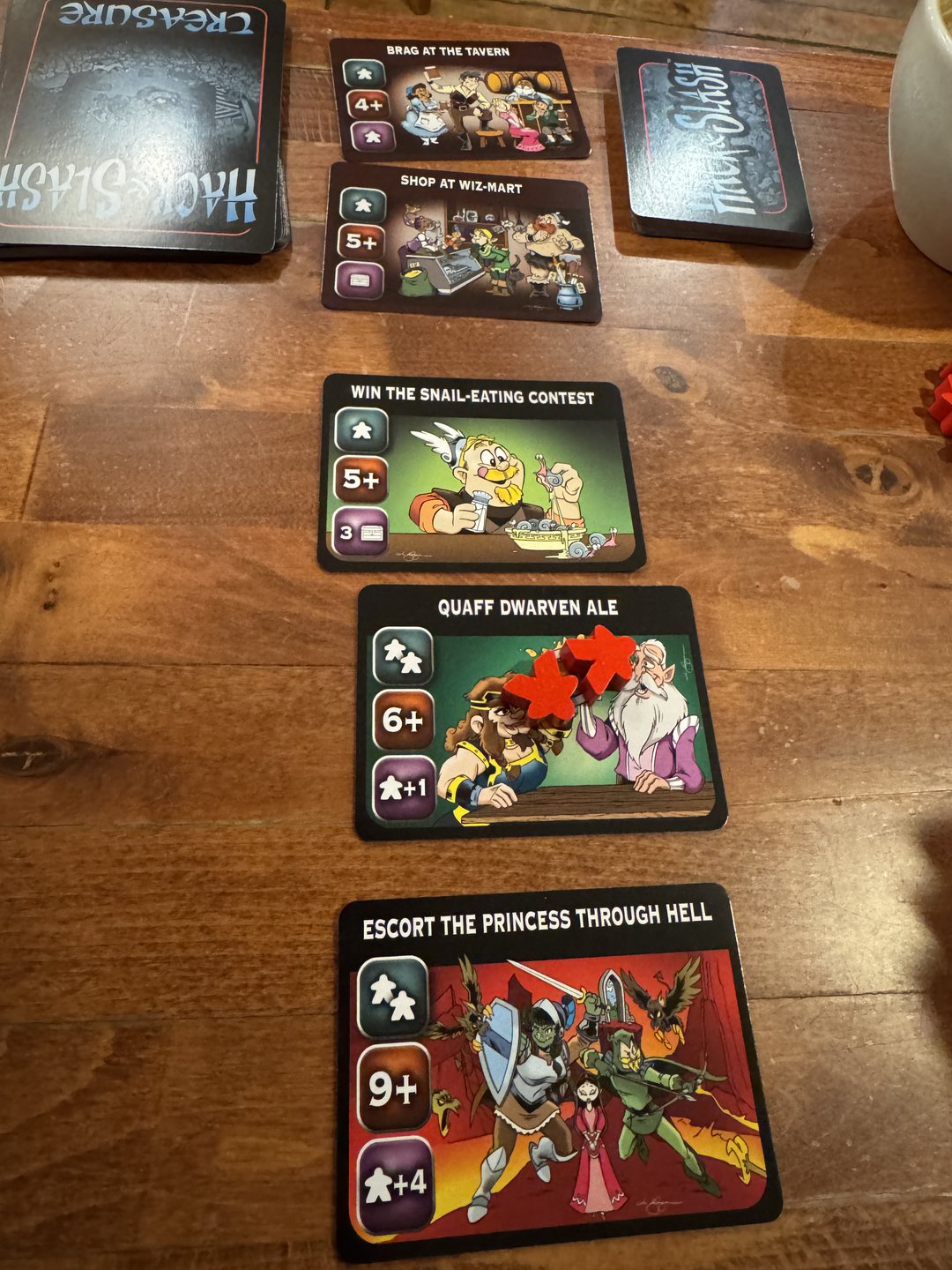
If you've ever seen a Steve Jackson game, you'll recognize this immediately. Zany cartoon art, a straight forward premise, and a goal to have some fun.
Friends, I can safely say that Hack & Slash: Deluxe has been in my board game bag every week so far in 2025. It’s simple, luck based, and good clean fun.
Running An Adventurer’s Guild In Five Easy Steps
The plot and the gameplay are both very simple. Instead of being a RPG character, you are instead running an adventurer’s guild, sending out teams to handle problems. Managing to complete quests lets you rack up victory points, recruit additional adventurers, or find treasure cards that might give you an advantage. If you fail quests, you lose adventurers, and get closer to the end of the game.
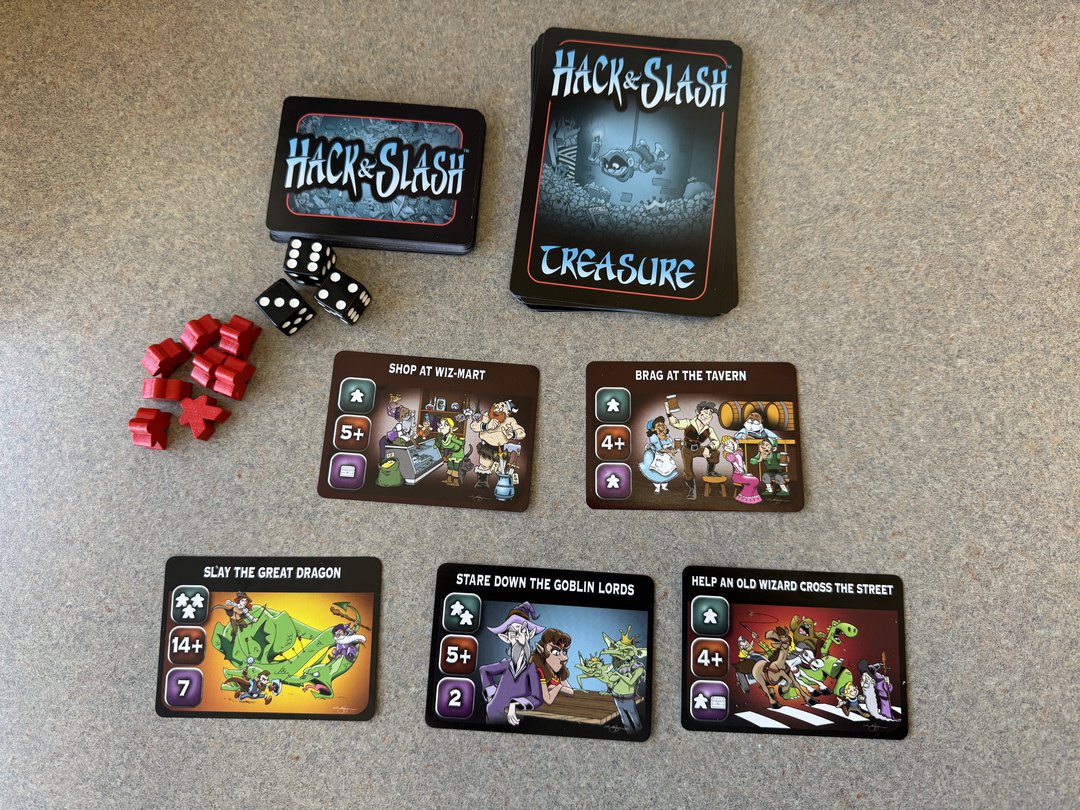
How a game starts. The two top quests are always available, while the bottom three change as they get completed, giving plenty of options.
How Hack & Slash works in practice is balancing resource management and pushing your luck. Everyone starts the game with 8 red adventuring meeples, and each quest asks you to send one, two, or three of them. Each adventurer sent lets you roll an additional die, but it changes the risk equation. Some cards need a 6+ to succeed, but you can only send one adventurer, while another lets you send two. The reward on the bottom right of the card usually reflects how dangerous the quest is going to be. If you succeed, get the card and the rewards. If you fail, you lose the adventurers you sent. Either way, the turn is over, and the next player goes.
We’re Off On A Secret Mission
This is a very straight forward game that often can feel just like you are playing Craps, hoping for high numbers. However, there are three complicating factors that I think elevate the game and have made it really fun for my friends group. They are moments of tension and laughter, and I think these factors are the reasons Hack and Slash keeps ending up on the table.
The first factor is not just risk, but the shared risk. Obviously, losing adventurers isn’t great, but when someone loses all of their meeples, the game becomes frenzied. Gameplay continues for one more round. They are forced to pass, and the game then ends at the end of that round. Everyone gets the same amount of turns, but that last turn is your chance to look around the table, see how many victory points everyone has, and decide to risk absolutely everything on a card that could get you into first place.
The second factor is the rescue mechanic. When you fail a quest, you have a chance to send in one additional meeple. This lets you reroll just one die, so it’s important to look at the state of things. Let’s say you were trying to get to 8+ with two dice. Did you roll a 5 and a 2? Then rerolling the 2 is a pretty good bet. If you had rolled snake eyes, well… not a good idea.
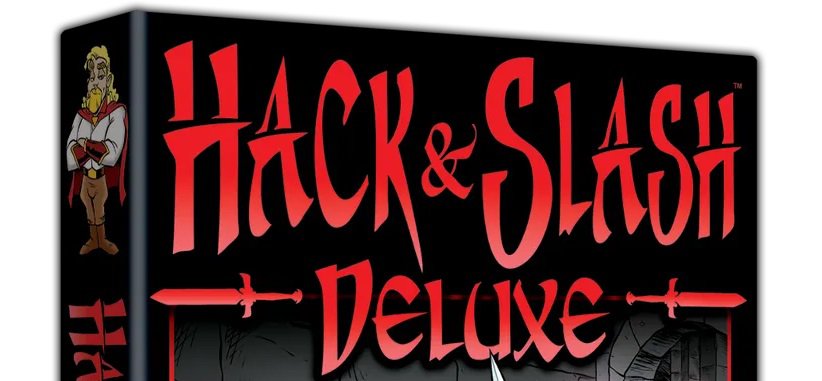
Editor’s note - this review is for Hack & Slash: Deluxe. If you were to buy standard Hack & Slash, it does not contain treasure cards, and has a few less quests. If you are interested in this game, we recommend getting the deluxe edition to get everything included in one self contained package. It even costs about $5 less than buying the base game and expansion separately.
Finally, the treasure cards. This is where the math towards victory gets the fuzziest. If you earn a treasure, you take one of the oversized cards off the top. Most are worth one or two points, but they more importantly can come with a special rule which can change things up. Maybe you’ll get a chance to get a free new adventurer when you roll doubles. Maybe you’ll get the chance to reduce the overall difficulty of cards on the table by sacrificing the guaranteed points of the treasure itself.
This is not a complex game, but the pace is so fast and there’s enough ways to raise the stakes that it doesn’t really matter. You’ll still get people holding their breath as they shake magic dice rocks and pray they roll sixes.
How It Overcomes "The Munchkin Problem"
At the risk of being slightly side tracked, I’m going to bring up an old sore spot as a way to highlight some of Hack & Slash’s strengths. Back in 2004, two mainstays to board games were Settlers of Catan and Munchkin. When I was running a gaming club in college, Settlers was a bit intimidating and dry for many people who had never played a board game before… but a take on dungeon crawls that was lighthearted and quick to understand? Munchkin got played a lot, and it was used to introduce people to board and card games. That is, until I had a few people either storm out of the event or end up in tears.
Yes, the game is incredibly simple: just get to level 10 to win by finding monsters and collecting silly upgrades. The start of the game was always this funny, joyous event as people found weird combinations of cards to use against monsters, scaling up quickly to level 9 within sometimes just within 15 minutes! However, there are a lot of ‘take that’ mechanics in Munchkin, allowing you to make encounters more difficult for other players or just outright strip power away from others.
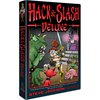 Hack and Slash: Deluxe
Hack and Slash: Deluxe
Publisher: Steve Jackson Games
Format: Board Game, Dice Game
Number of Players: 3-6 Players
Play Time: 15-30 Minutes
Price: $30
Review Copy: This was a review copy received from PAX Unplugged 2024
What this turned Munchkin into was a game where people thought the game was going to be fast, but then could continue for another hour as multiple players ended up at level 9, frozen in place. It could be very frustrating, and playing at a public event stressful. It took an experience that presented itself as casual and fun and turned it into a much more aggressive game. Some people might absolutely love the cut-throat play of Munchkin, and that's okay! However, I often found myself finding people trying out board games for the first time coming away upset, so it lost favor with people I knew.
I say all this because I think it highlights a lot of positives about Hack & Slash and the advancement of game design. This is simply a cleaner, faster game. Even when teaching people, games are usually only 15-25 minutes long. There is no ‘take that’ mechanic where you actively sabotage others, but you still feel in competition with the other players. Finally, I have come to really appreciate games that have a determined end. One person losing all figures means the game winds down, and they can still have won if they were lucky on victory points.
It’s a game that’s easy to learn, quick to understand, but still has a sense of competition. At any time, you can total up how many victory points are around the table and use that to inform how big a bet you want to make on your turn. You can go for slow and steady point accrual, or huge swings as the last round approaches.
Hack And Slash Deluxe Is A Great Lucky Dice Game
I really enjoy Hack & Slash for what it is - a fun, simple, push-your-luck game. The images on the cards are silly, there’s a touch of strategy between the treasure cards and choosing your quests, and there’s one heck of a rush when you decide to throw caution to the wind and let it all ride on the toughest roll on the table.
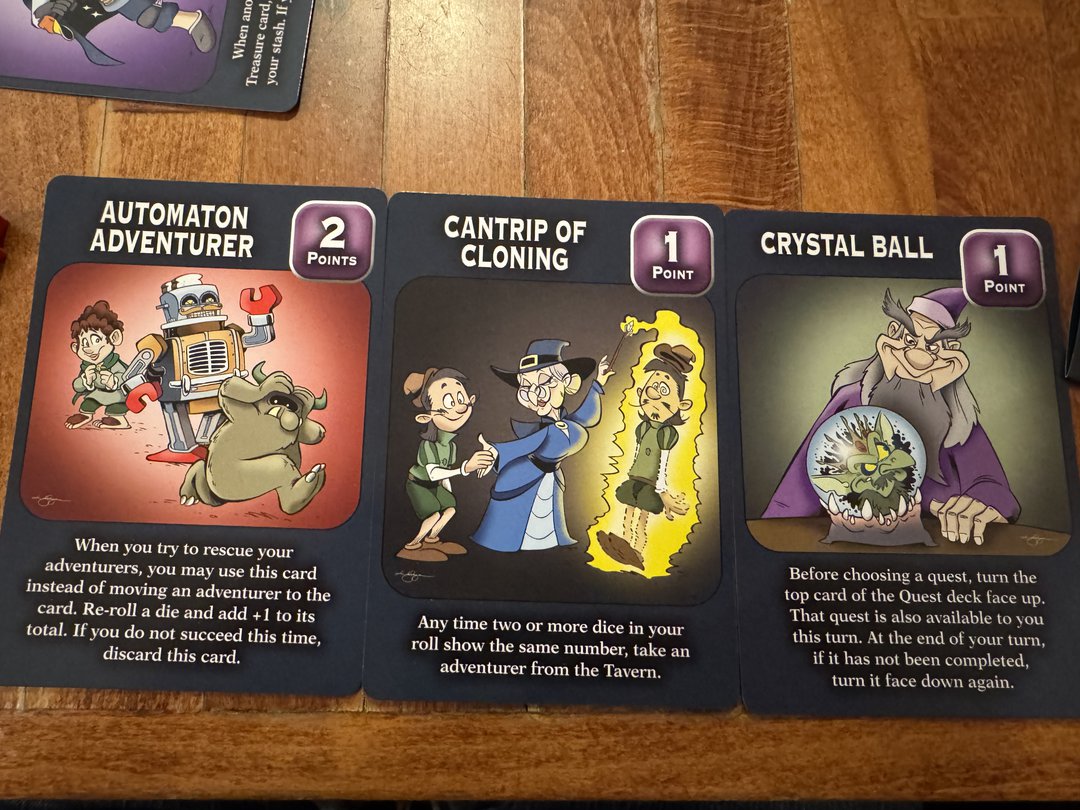
If you have a board game group that likes having a good filler or ice breaker game, I heartily recommend Hack & Slash Deluxe. It’s just $30 dollars, comes in a nice small box, and it’s easy to set up and start playing. Games are short and straight forward, and if you have people who like the risk of dice, I think it’s a no brainer. I’ve played the game over ten times now, with about fifteen different people total. I’ve had many requests for me to bring it out again at game night. We play while we wait for other people to show up, or just as a way to wind down after playing a big head scratcher. I’ve seen groups laughing loudly and pounding the table when someone rolls three sixes… or three ones.
Yes, Hack & Slash is a simple game. But who cares? It’s fun, and when I’m hanging out with friends, that’s always the goal. Maybe next week, I’ll be the one who has a lucky streak and emerge victorious. And if I don’t? Well, I’m not at a craps table; I’ll just laugh and wait for the next round to come out on top.